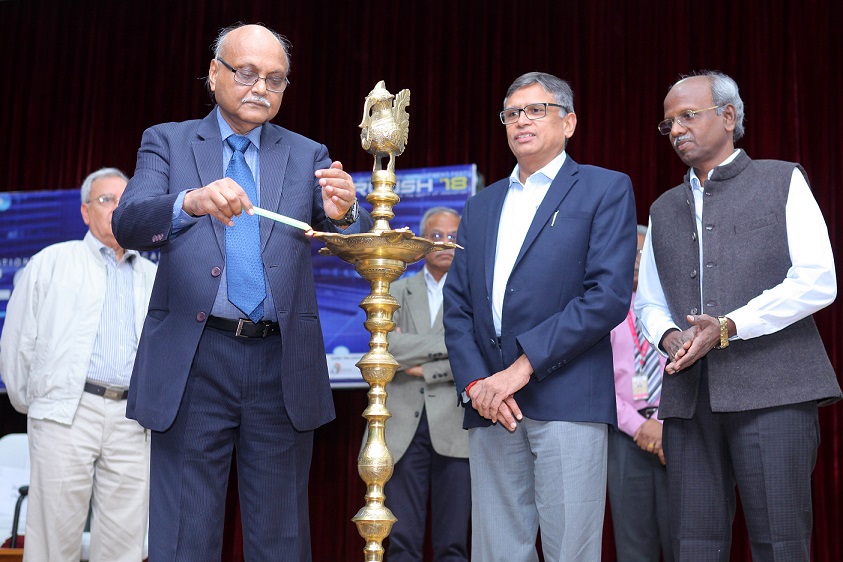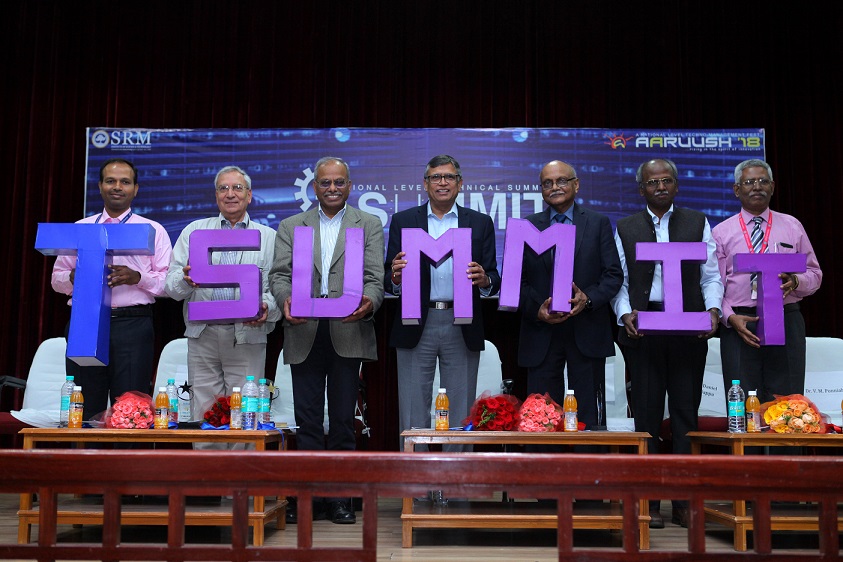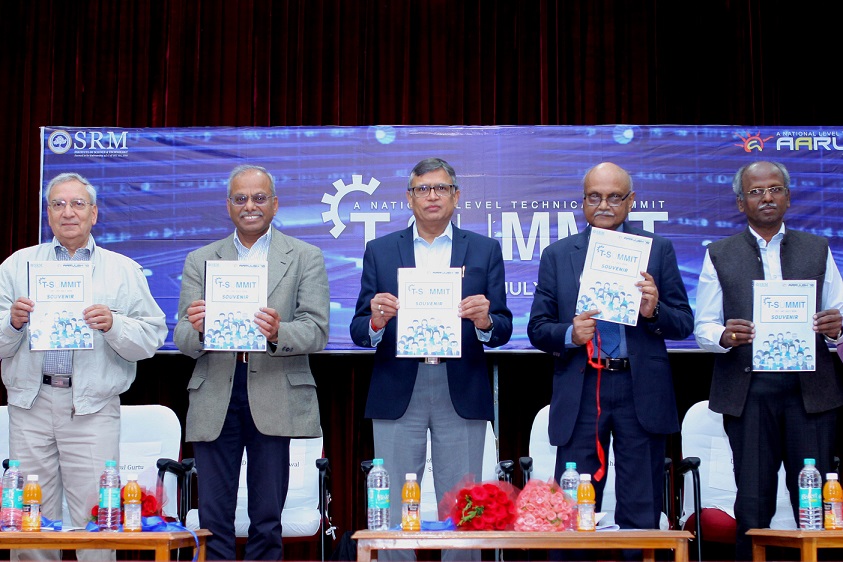T-Summit’18 – SRMIST: Aaruush’18
SRM Institute of Science and Technology has always promoted growth in innovation and technology by urging the young minds to come together with new concepts to drive the nation towards a better tomorrow. This resulted in the initiation of one of the largest techno-management fests in the country, Aaruush.
This fest offers the students a platform to showcase their ideas and to develop their skills. Starting from the paper presentations to the elaborate workshops, from the student expos to the challenging events, from the technicalities to the frolic of the pro-shows, Aaruush has it all. Since its inception, Aaruush has been a host to personalities like Dr. A.P.J Abdul Kalam, who inaugurated the first edition in 2007. Dignitaries like ChetanBhagat, Rajat Kapoor and Nitin Shukla have conducted the main quiz. Guest lectures by luminaries like RajanAnadan-CEO Google India, Tessy Thomas-Defence Director for Agni-IV, Dr. Vara Prasad Reddy, Chairman ShantaBiotechnics and N. Balakrishnan, Associate Director IISC have enlightened the students. Yearlong competitions like Konvolve, Intra-SRM Multidisciplinary Project Competition and Exhibition, Swastika, an Interschool Quiz competition keep the essence of Aaruush alive among the students of the institute.
The Technical Summit (T-Summit) is one such event which intends to contribute to the society by developing innovative ideas. T-Summit being held at Mini Hall-2, T.P. Ganesan Auditorium, SRM Institute of Science and Technology, from 13 July 2018 to 14 July 2018 is the gathering of the intellectual cream of the nation for the sessions of unparalleled brain-storming and exchange of ideas. The summit intends to focus on the essentials of innovation and develop a market space within which the system can unlock new forms of values and break the traditional boundaries to achieve novelty. The theme of the summit is “Young Innovation”, through which the summit plans to define clear roles for propelling the innovation agenda and aims to foster a learning group for the overall development. The T-Summit incorporates of 4 sessions spread over the two days. The session 1 post the inaugural ceremony on Day 1 invites all the delegates to present an introductory address of their fest and the measures they took in accordance to the agendas finalized in the second edition of T-Summit. The session 2 expects to bring out Visionary and Strategic Innovators, Discoverers and Experimenters for the development vision. This can be premeditated through a Round Table Conference, which will incite the delegates to arduously contribute to the society and provide out the necessary outcome. Day-2 shall commence with a recap of the sessions of day 1 followed by session 3. Session 3 shall discuss in detail the proposed solutions and resolutions with respect to the agendas of the T-Summit’18 and move swiftly into the session 4 which majorly contributes to the document formation of the two days. The 4 sessions will adjourn with the valedictory closing the T-summit for the year of 2019.
T-summit’18 shall be grazed by Dr. R. K. Sinha – Former Secretary to the Government of India and Chairman of AEC,Former Director, Bhabha Atomic Research Centre. He had served as the Secretary to the Government of India, Department of Atomic Energy (DAE) and Chairman of the Atomic Energy Commission (AEC), Government of India from April 2012 to October 2015. Prior to that, Ratan Kumar Sinha had served as Director of Bhabha Atomic Research Centre (BARC), Mumbai from May 2010 to June 2012. During his four decades of illustrious career, Dr.Ratan Kumar Sinha held several important positions related to design & development of nuclear reactors for the Indian nuclear programme. He has been actively involved in the development of Advanced Heavy Water Reactor (AHWR) and Compact High Temperature Reactor (CHTR), two of the highly acknowledged technological innovations which are suitable for large scale deployment of nuclear power, particularly in Indian scenario.
Dr. Rakesh Agrawal – Professor, Purdue University, recipient of National Medal of Technology and Innovation in 2011 and the IRI Achievement Award in 2007. Dr. Rakesh Agrawal’s technical contributions towards improving the energy efficiency of separation plants producing industrial gases such as O2 and N2 from air, and in the general area of gas liquefaction and separation, has led to 116 US patents and 500 international patents along with several peer-reviewed publications. In recognition of his technical accomplishments during his more than two decades at Air Products and Chemicals, Inc., he was announced as the recipient of National Medal of Technology and Innovation for 2011, by the White House.
Dr.AtulGurtu is India’s leading high energy physicist. He attended Punjab University, Chandigarh, where he pursued Ph.D in Physics, and thereafter joined the Tata Institute of Fundamental Research (TIFR) in 1969. He retired in 2011 as a senior professor, after an illustrious career spanning over four decades in particle physics research, during which he participated in numerous experimental projects in collaboration with CERN, Geneva, from 1969 to 2011, as part of high energy physics group at TIFR. He is the man who led the 70-member Indian team which participated in CERN experiment of first proton run at the Large Hadron Collider. From 2011-12 he was Distinguished Professor at the King Abdulaziz University, Jeddah, Saudi Arabia.
Dr. J. Daniel Chellappa an Indian Nuclear Scientist with Department of Atomic Energy and Indira Gandhi Centre for Atomic Research, Chennai. He is now serving as the Assistant Director of the Indira Gandhi Centre for Atomic Research, Chennai.
Mr. SonamWangchuk, founding-director of the Students; Educational and Cultural Movement of Ladakh) SonamWangchuk (born 1 September 1966) is a Ladakhi engineer, innovator and education reformist. He is the founding-director of the Students; Educational and Cultural Movement of Ladakh (SECMOL) which was founded in 1988 by a group of students who had been in his own words, the ‘victims’ of an alien education system foisted on Ladakh.He is also known for designing the SECMOL campus that runs on solar energy and uses no fossil fuels for cooking, lighting or heating.





